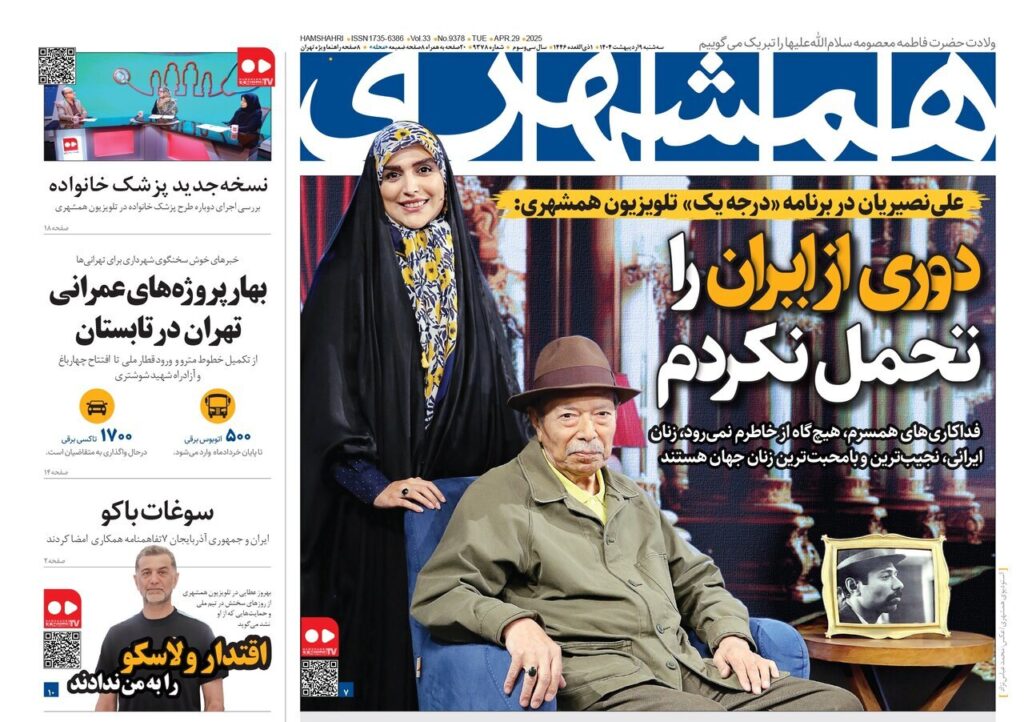TEHRAN – Hamshari discussed the meeting of Iran and Azerbaijani president in Baku in an interview with Eurasian affairs expert Mehdi Korusand.
He said: Today we are witnessing foreign interventionist actors in the name of the Zionist regime in the relationship between Tehran and Baku. However, the issue of ethnicity could be a factor in a reconciliation between Iran and the Republic of Azerbaijan. Religious commonalities can pave the way for wider cooperation. Due to the existence of ethnic and religious commonalities, Iran has adopted a tolerant approach to some of Baku’s constructive actions. Tehran’s approach to Baku should remain on this path. Bilateral relations must be accepted at a low level at present, and should be directed towards increasing the levels of economic and trade exchange, particularly by leveraging border capabilities. Additionally, completing the north-south corridor will allow for increased transport cooperation on both sides in the freight and passenger traffic areas. Increased economic cooperation in various fields can minimize general concerns and prevent the disruptive role of interventionists.
Donya-e-eqtesad: Deterrence through diplomacy
Donya Ektesad dedicated his editorial to the strategic aspects of the Islamic Republic’s decision to begin negotiations with the United States, writing: In the Middle East security environment, being aware of threats is an important component of deterrence. The rapid implementation of the operation has enhanced True Promises I and II to the Islamic Republic’s reliability of Iran’s deterrent in regional strategic memory. After adjusting the terms of dialogue, the Islamic Republic of Iran shows that it will not hesitate to carry out military operations, with the logic of deterrence and the goal of peace and stability, and after adjusting the terms of dialogue, it takes a firm and decisive step into the diplomatic path. Last year, by carrying out military operations, demonstrating military preparations, holding regional diplomatic conferences, and clearly explaining principled policies regarding the proper commitment to regional and international peace, the Islamic Republic of Iran proved the credibility of its message and paved the way in which it reached the agreement (on the nuclear program).
Javan: Strongly neutralizes the illusion of interference in negotiations
In his analysis, Jawan tackled Netanyahu’s ridiculous rhetoric, saying: In his position on the outlook for indirect nuclear negotiations between Iran and the United States, Netanyahu argued that Tel Aviv only agreed to an agreement that eliminates Iran’s ability to enrich uranium. Netanyahu’s purity is surprising as he wants to instruct President Trump to do what he can and cannot do with diplomacy with Iran. Netanyahu opposes negotiations in a situation where US President Donald Trump himself has openly or implicitly expressed optimism about the negotiations. Foreign Ministry spokesman Esmaeil Baghaei says officials from the Zionist government are trying to make such a statement with two goals. One is to cast a shadow over the genocide that takes place in occupied Palestine and then destroy the diplomatic processes in the region. They certainly know more than anyone else that adventurism and false behavior towards Iran are filled with overwhelming responses.
Etemado: Constructive relationships with northern neighbors
The relationship between Iran and the Republic of Azerbaijan is multifaceted as it includes historical, political, economic and trade aspects. In the political field, cooperation and tension have always been part of the relationship between Iran and Azabaijan. On the one hand, the two countries maintain regional stability and share common interests in their struggle with separatism, while on the other hand, geopolitical rivals complicate interactions. Constructive interactions can strengthen multiple aspects of the interests of both countries and enhance the geopolitical and geopolitical security of Iran in the South Caucasus and the Republic of Azerbaijan before causing problems with economic, commercial and technical concerns. In these new conditions, this useful factor needs to be given special attention from a professional and technical perspective by policymakers in both countries. Specifically, the failure to complete multiple diplomatic relations between Tehran and Baku is a factor that creates disorder in the South Caucasus. This is a desirable factor for the western South Caucasus and Iranian rivals.

